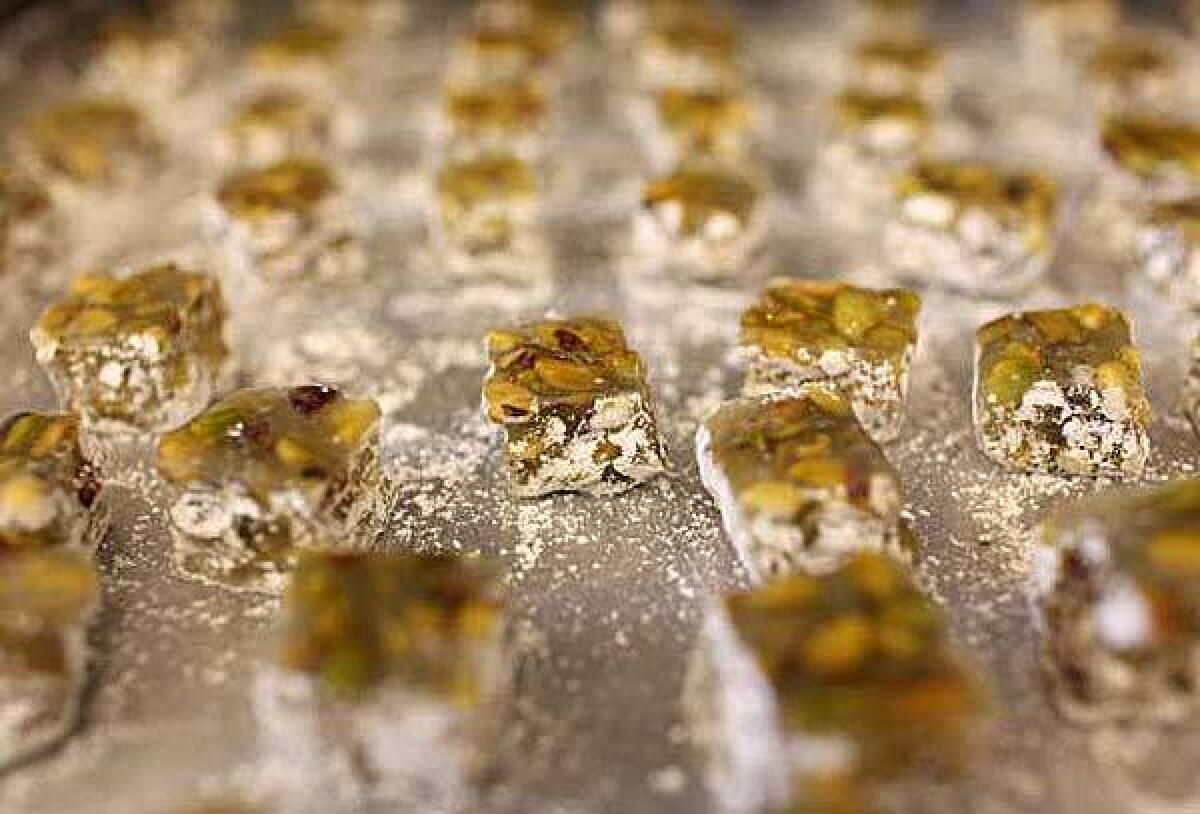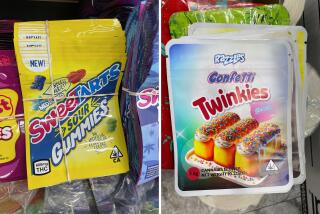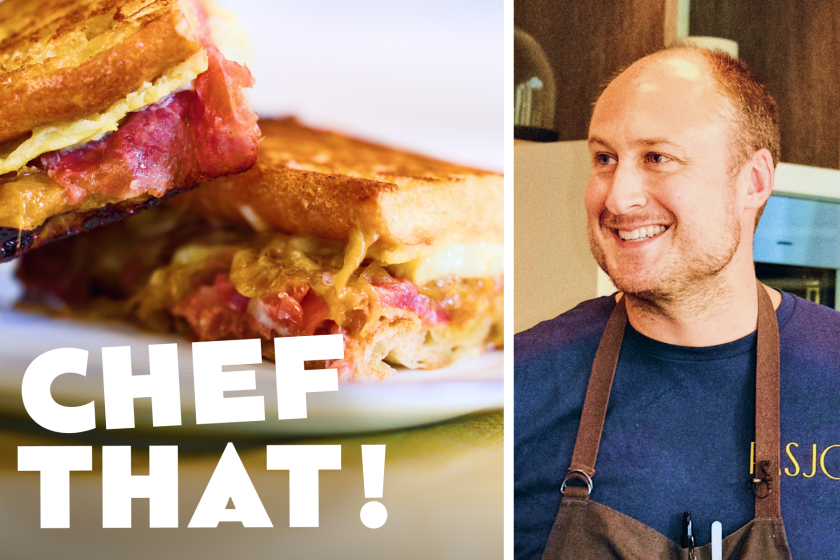Three generations of Turkish delight in Southern California

RELATED: Three generations of Turkish delight in Southern California
Tucked in the back room of a tiny powdered-sugar-dusted San Fernando Valley storefront, Armand Sahakian patiently tends to the sweet syrup bubbling in two giant copper caldrons. Six days a week, the owner of Nory Candy & Pastry delicately flavors each batch with citrusy drops of bergamot oil, rosewater or the essences of various fruits, then pours the candy into wooden trays to cool into gelée-like locum, the confection known as Turkish delight.
That this story isn’t one of C.S. Lewis’ Turkish delight-filled “Chronicles of Narnia” fantasies is clear from the Winnetka shop’s parking lot, where the weathered Nory Locum sign is wedged between those for a nail salon and dry cleaners. But for this Armenian candy maker, what lies behind that front door really is a fantasy of sorts.
Sahakian and his mentor, the candy shop’s 71-year-old former owner, Dickran Jibilian, have been sharing their favorite childhood sweet with their adopted country since long before the box-office-driven surge in demand for Nory’s Turkish delight. And in the process they’ve developed an unexpected father-and-son-like bond.
“We just connected; it was one of those amazing moments,” says Sahakian, who took over the shop a couple of years ago and is covered in almost as much snowy-white cornstarch and powdered sugar as the candy he makes.
Jibilian and his wife, Armen, immigrated to Southern California from Egypt and purchased the Turkish delight factory more than 30 years ago from Nory Hovagimian, an Armenian immigrant from Romania. Hovagimian had opened the small candy shop in Hollywood in 1964, and the Jibilians moved the company to its current location in 1981.
FOR THE RECORD: An earlier version of this story and a headline gave an incorrect last name, Bastdmajian, for former owner Nory Hovagimian.
Around the same time, Sahakian’s family had fled Lebanon because of the country’s civil war and arrived in Pasadena with their 14-year-old son. “Even though Dickran, [Hovagimian] and I are from different places, we’re all Armenian so we all grew up eating Turkish delight,” says Sahakian. The soft, chewy candy, which originated in the Ottoman Empire as early as the 16th century, is widely available throughout the Middle East and central Europe today.
As a teenager, Sahakian says he often picked up the Nory’s walnut version of the marshmallow-like sweet to make a common Lebanese snack. “You flatten the locum between cookies to make something like s’mores,” he says, picking up and pulling a chubby nut-filled square to demonstrate its flexibility.
He and Jibilian met in 2009 when Sahakian happened upon the shop’s “for sale” listing online. “I think Dickran really wanted someone to buy the shop who he felt was right for it,” Sahakian says.
But candy making was not always in Sahakian’s dreams. During the 1990s, he owned two shoe repair shops in Newport Beach. “I had trained to be a shoe repairman like my father, but at some point making orthotics wasn’t all that interesting anymore,” he says.
Sahakian traded his shoehorns for a candy thermometer shortly after signing up for cooking classes at Fullerton’s Orange County School of Culinary Arts (now the Culinary Arts Institute). He worked his way through several hotel kitchens, including the Sofitel in Los Angeles, before landing a job as the director of food services at Santa Anita Park.
“Working at the racetrack was a really great, fun job until I had kids,” Sahakian says. “I wanted to spend more time with them.” Jibilian’s “for sale” listing came around at just the right time.
This wasn’t the type of business transaction that involved handing over a check in exchange for the front door keys. “I trained under him for months, following his every move,” recalls Sahakian, as he scrapes down the sides of the copper pot with a metal paint scraper to prevent the caramelization of the cornstarch-laden sugar syrup.
Nory Candy & Pastry’s former owner now stops by the shop weekly to check on his prodigy. “Dickran comes in, pokes at the candy and says, ‘This batch is good, yes, yes,’” says Sahakian, smiling. “He really treats me like a son.”
Sahakian checks the consistency of the simmering syrup and deems it satisfactory, then adds a few squeezes of bergamot oil from a dropper. “It’s not a smell that many [Americans] know,” he says of the bitter citrus oil, adding that Middle Eastern shops are still his primary buyers for the traditional locum flavors such as rose, mint, licorice and bergamot (the nut varieties are more like a chewy nut brittle packed with toasted almonds, hazelnuts, pistachios or walnuts).
Once the flavorings have been added, Sahakian pours the syrup into several wooden trays covered in a thick layer of cornstarch to prevent the candies from sticking to the trays. They’ll be left to set up overnight, then sliced and given a final dredging in powdered sugar by his two part-time assistants.
“You really don’t know if the batch is 100% successful until you cut it the next day,” says Sahakian, adding that heat and humidity are the worst culprits of a bad batch. “If it’s too gummy, it has no more delight in it.”
The candy’s finicky nature persuaded Sahakian to convert the retail area of the shop into a packing room shortly after he purchased it. “Walk-in traffic takes too much time today, and I need to be watching the candy,” Sahakian says. Today, the candy is available only online or at local grocery stores and specialty markets.
Sahakian drops off orders at the post office every day before picking up his 5-year-old twin girls from school — two time-consuming chores that he may soon have to hand off to others for more copper caldron time.
Not that Sahakian is complaining. “It’s pretty great to get an order from a teacher in Tennessee whose students have never even tried Turkish delight.”
Nory locum is available online at https://www.norylocum.com and at most Jon’s markets in the Los Angeles area.
More to Read
Eat your way across L.A.
Get our weekly Tasting Notes newsletter for reviews, news and more.
You may occasionally receive promotional content from the Los Angeles Times.







